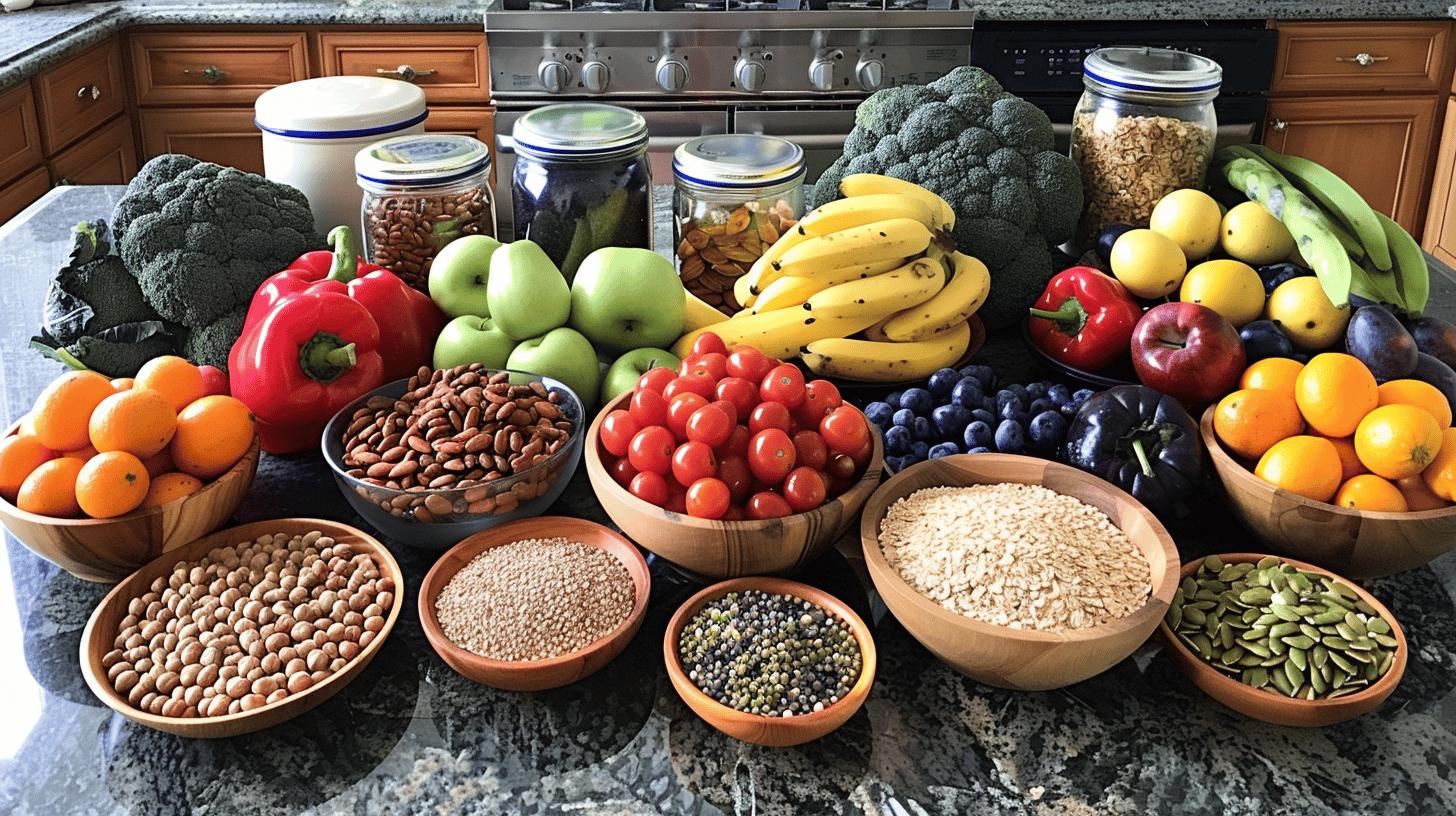Adopting healthy eating habits is essential for maintaining a balanced diet and overall well-being. This article outlines seven practical habits that can help you achieve a more nutritious lifestyle. These habits focus on incorporating a variety of foods, practising portion control, staying hydrated, limiting sugar and salt intake, eating regular meals, incorporating more whole foods, and planning and preparing meals in advance. Implementing these strategies can lead to better health, increased energy levels, and a reduced risk of chronic diseases. Let's explore these habits in detail and learn how they can contribute to a healthier, more balanced diet.
Incorporate a Variety of Foods into Your Diet
Consuming a variety of foods is essential for ensuring a balanced intake of essential nutrients. Different foods provide different nutrients, such as vitamins, minerals, fiber, and antioxidants, which are crucial for maintaining overall health.
- Fruits
- Vegetables
- Whole grains
- Lean proteins
- Healthy fats
Incorporating a range of fruits into your diet supplies your body with vital vitamins and antioxidants. For instance, oranges are rich in vitamin C, while berries offer a high concentration of antioxidants that help combat free radicals. Vegetables, such as spinach and broccoli, provide essential minerals like iron and calcium, contributing to bone health and muscle function.
Whole grains, such as quinoa and brown rice, are excellent sources of dietary fiber, which aids in digestion and helps maintain stable blood sugar levels. Lean proteins, including chicken breast and legumes, supply essential amino acids necessary for muscle repair and growth. Healthy fats, found in avocados and nuts, support brain function and help absorb fat-soluble vitamins.
A varied diet not only ensures you receive a wide array of nutrients but also helps prevent nutrient deficiencies. By including diverse food categories, you can improve your overall well-being and reduce the risk of chronic diseases.
Practice Portion Control

Portion control is essential for maintaining a balanced diet and preventing overeating. By managing the quantities of food consumed in each meal, individuals can better regulate their caloric intake and ensure they are not consuming excessive amounts of any one nutrient.
- Use smaller plates
- Measure portions
- Avoid eating directly from packages
- Listen to hunger and fullness cues
Practicing portion control offers several benefits. Firstly, it aids in weight management by preventing the consumption of extra calories that the body does not need. Secondly, it helps maintain overall health by ensuring that meals are balanced and not overly heavy in one particular type of food. By using smaller plates, individuals can visually trick their minds into feeling satisfied with smaller portions. Measuring portions helps to keep servings in check and avoid unintentional overeating. Avoiding eating directly from packages minimizes the risk of mindless snacking, and listening to hunger and fullness cues ensures that one eats only when truly hungry and stops when satisfied, rather than when overly full.
Stay Hydrated
Staying hydrated is crucial for maintaining overall health and well-being. Water is essential for several bodily functions, including digestion, circulation, and temperature regulation. It helps transport nutrients to cells, remove waste products, and maintain the balance of bodily fluids. Proper hydration also supports skin health, joint lubrication, and optimal cognitive function. Without sufficient water intake, the body struggles to perform these critical tasks efficiently.
- Aim for 8 glasses of water daily
- Drink water before meals
- Carry a water bottle
- Add natural flavors like lemon or cucumber
Dehydration can lead to a range of health issues, including headaches, fatigue, and impaired concentration. Severe dehydration can cause more serious complications such as kidney stones and urinary tract infections. Ensuring consistent hydration throughout the day helps prevent these issues and keeps the body functioning optimally. Drinking water before meals can aid in digestion and help control appetite, while carrying a water bottle ensures easy access to hydration. Adding natural flavors like lemon or cucumber can make water more enjoyable to drink, encouraging better hydration habits.
Limit Sugar and Salt Intake

Excessive sugar and salt consumption can lead to significant health issues, including heart disease, hypertension, and diabetes. Reducing intake of these components is crucial for maintaining a balanced diet and promoting long-term health.
- Natural sweeteners (honey, Stevia)
- Herbs and spices
- Reduced-sodium products
- Fresh fruits
- Vinegars and citrus juices
High sugar intake is linked to increased risk of obesity, type 2 diabetes, and tooth decay. To reduce sugar in your diet, opt for natural sweeteners like honey or Stevia, which provide sweetness without the adverse health effects. Incorporating fresh fruits into meals and snacks can also satisfy sweet cravings while providing essential vitamins and fiber. Reading nutrition labels and choosing products with no added sugars can help minimize sugar consumption.
Excessive salt intake is associated with elevated blood pressure, which can lead to heart disease and stroke. To cut down on salt, use herbs and spices to enhance the flavor of your meals. This not only reduces the need for salt but also adds beneficial antioxidants and nutrients. Opt for reduced-sodium products when available and avoid high-sodium processed foods. Additionally, using vinegars and citrus juices can add tangy flavors to dishes, making them more enjoyable without the need for extra salt.
By adopting these practices, you can significantly reduce sugar and salt intake, thereby lowering the risk of chronic diseases and achieving a more balanced diet.
Eat Regular Meals
Eating regular meals and snacks is crucial for maintaining consistent energy levels throughout the day. When meals are spaced out evenly, the body receives a steady supply of nutrients, preventing the extreme hunger that can often lead to overeating. This approach ensures that energy levels remain stable, allowing for better focus and productivity.
- Steady energy levels
- Better metabolism
- Consistent blood sugar levels
- Avoid overeating
Regular meal timing plays a significant role in regulating metabolism and maintaining consistent blood sugar levels. By eating at regular intervals, the body's metabolic rate remains steady, which helps in the efficient conversion of food into energy. Additionally, consistent blood sugar levels reduce the risk of insulin spikes and crashes, which can lead to fatigue and irritability. Planning regular meals involves setting specific times for breakfast, lunch, and dinner, and incorporating healthy snacks in between. This structured approach not only helps in managing hunger but also promotes overall well-being by ensuring the body gets the nutrients it needs at the right times.
Incorporate More Whole Foods

Incorporating more whole foods into your diet is essential for obtaining a wide range of nutrients that processed foods often lack. Whole foods, such as unprocessed fruits, vegetables, nuts, seeds, and whole grains, are rich in essential vitamins, minerals, antioxidants, and fiber.
- Fruits
- Vegetables
- Nuts
- Seeds
- Whole grains
Whole foods provide numerous nutritional advantages. For example, fruits like apples and berries are loaded with vitamins and antioxidants that help combat inflammation and support immune function. Vegetables, such as kale and carrots, offer essential minerals and fiber, aiding digestion and promoting heart health. Nuts and seeds, including almonds and chia seeds, are excellent sources of healthy fats, protein, and micronutrients that contribute to brain health and sustained energy levels. Whole grains, such as oats and brown rice, are high in dietary fiber, which helps maintain stable blood sugar levels and supports digestive health.
To integrate whole foods into daily meals, start by planning a balanced breakfast that includes whole grains, such as oatmeal topped with fresh fruits and nuts. For lunch and dinner, focus on incorporating a variety of vegetables and lean proteins, such as a mixed salad with grilled chicken and a side of quinoa. Snack on whole foods like apple slices with almond butter or a handful of mixed nuts. By making small, consistent changes, you can significantly improve your nutrient intake and overall health.
Plan and Prepare Meals in Advance
Planning and preparing meals in advance is a powerful strategy for making healthier choices and avoiding the temptation of fast food or unhealthy snacks. By dedicating time to meal planning, individuals can manage their willpower more effectively and ensure consistent, healthy eating habits throughout the day.
- Create a weekly menu
- Grocery shop with a list
- Prep ingredients in advance
- Use storage containers
- Schedule meal prep time
To implement meal planning and preparation, start by creating a weekly menu. This approach not only helps in organizing daily meals but also ensures a balanced intake of essential nutrients. Once the menu is set, make a detailed grocery list to avoid impulsive purchases and stick to nutritious options. Prepping ingredients in advance, such as chopping vegetables or marinating proteins, can save time during busy weekdays and make cooking more efficient.
Using storage containers is another crucial aspect of meal planning. Invest in a variety of containers that can store prepped ingredients and cooked meals. This practice keeps food fresh and organized, making it easier to grab a healthy meal on the go. Finally, schedule dedicated meal prep time each week, ideally on weekends or less busy days. By setting aside specific times for meal prep, individuals can establish a routine that supports their healthy eating goals and reduces the likelihood of resorting to unhealthy food choices.
Adopting these 7 healthy eating habits can significantly enhance one's overall well-being. By incorporating a variety of foods, practicing portion control, staying hydrated, limiting sugar and salt intake, eating regular meals, incorporating more whole foods, and planning meals in advance, individuals can create a balanced and nutritious diet. These habits not only help in preventing nutrient deficiencies and managing weight but also contribute to long-term health. Embracing these strategies ensures a consistent intake of essential nutrients, promoting a healthier lifestyle.
FAQ
What are 10 healthy eating habits?
A: Ten healthy eating habits include consuming a variety of foods, practising portion control, staying hydrated, limiting sugar and salt intake, eating regular meals, incorporating more whole foods, planning and preparing meals in advance, avoiding processed foods, reading nutrition labels, and listening to your body’s hunger and fullness cues.
What are 7 healthy eating habits for adults?
A: Seven healthy eating habits for adults include eating a balanced variety of foods, controlling portion sizes, staying hydrated, limiting added sugars and salts, eating regular, balanced meals, incorporating whole foods, and planning meals ahead of time.
How to eat healthy food every day?
A: To eat healthy food every day, focus on consuming a variety of foods from all food groups, control portion sizes, stay hydrated, limit intake of sugars and salts, and prepare meals in advance to ensure balanced nutrition.
What is healthy eating?
A: Healthy eating involves consuming a variety of nutrient-rich foods in appropriate portions, maintaining balance with all food groups, staying hydrated, and reducing intake of sugars and salts to support overall health.
What are the 7 foods you should eat every day?
A: Seven foods you should eat every day are vegetables, fruits, whole grains, lean proteins, healthy fats, nuts, and seeds. These foods provide essential nutrients for a balanced diet.
What are 7 healthy foods?
A: Seven healthy foods include leafy greens, berries, whole grains, lean meats, nuts, seeds, and legumes. These foods are rich in essential nutrients, vitamins, and minerals.
What are the 7 components of a healthy diet?
A: The seven components of a healthy diet are carbohydrates, proteins, fats, vitamins, minerals, fiber, and water. Consuming a balanced intake of these components promotes overall health and well-being.

